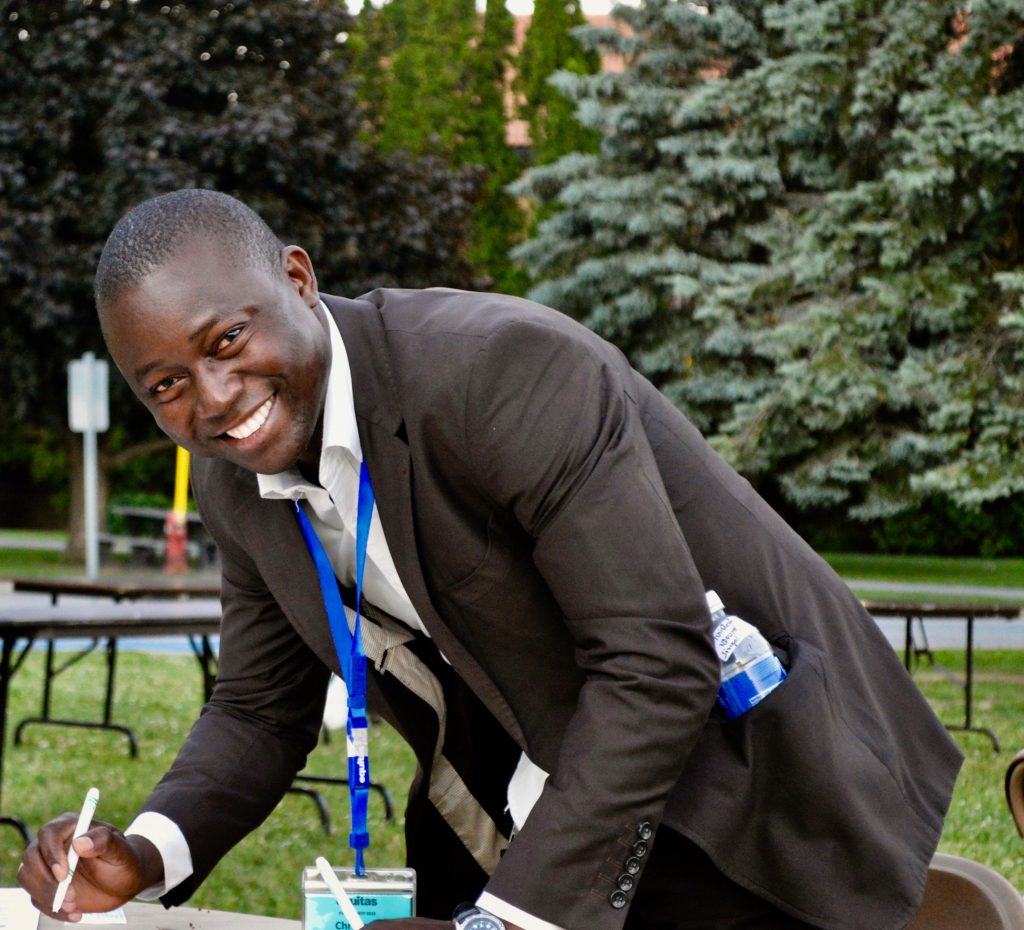
Christoph Ndouye, a recent participant in Equitas’ 39th International Human Rights Training Program (IHRTP), works to improve living conditions for refugees in Senegal.
Ndouye was a program officer for Dynamique de paix en Casamance for three years before moving on to La Caritas where he works as a project animator. His role is to help refugees reintegrate into their former villages upon their return from Gambia, where they fled for varying periods of time during the Casamance conflict – an ongoing conflict between the region’s separatist movement (the Movement of Democratic Forces of Casamance) and the Government of Senegal. “[We hope that] they can feel like they’re at home at least. Not that they’re strangers,” Ndouye said, adding that the living conditions in Gambia weren’t great. The project aims to provide financial assistance and trainings related to hygiene, sanitation, social cohesion, good governance, and leadership for the management committees that they establish in each community.
In partnership with Catholic Relief Services (CRS), Ndouye said La Caritas facilitated an Emergency Response and Recovery project that assisted the refugee communities as well. According to its website, the CRS helps “people obtain the tools and skills they need to manage their own recovery. Our projects build on local systems to ensure long-term success.” Specifically, the project prioritizes access to housing, the right to peace and the right to a healthy environment.
After explaining that many of the villages lack access to toilets and showers, Ndouye said that a big part of La Caritas’ project focuses on building them. “Can you imagine? They do their business outside in the open air, in the winter! You see how that increases the possibility of contracting diseases?”
International Human Rights Training Program
Ndouye, who heard about the program through his former manager Henry Ndecky (who attended the program in 2015), said his main takeaway from the IHRTP was the participatory approach. The approach is simple, but extremely effective. Rather than having one person teach a group of people, the participants are encouraged to learn from one another. The facilitator provides the framework, but the participants provide the content. Enabling these discussions in a safe space means sensitizing people to realities that they might never have been exposed to otherwise. “During those exchanges, I learned a lot,” Ndouye said. “It was a very strong moment of sharing. That’s important to me. It’s probably one of the things I liked the most.”
The approach allowed Ndouye to interact with members of the LGBTQI+ community for the first time. “It’s not part of my culture, so I only had basic access to information about the LGBTQ community,” Ndouye said. “I never imagined that I’d have the opportunity to meet a trans man or woman and get to exchange with them.”
The participatory approach is only one of several concepts that participants take home with them at the end of the IHRTP. “[I also plan to focus on] the integration of the gender-based approach,” Ndouye said. “Here, when we form committees, we automatically think there need to be men, women, youth… But how do we maintain that? What is the role of every person to make their experiences [as minorities] help the development [and] the culture of human rights? For me, this is an element that I will put emphasis on to help my team at the ground level.”
Ndouye is wholeheartedly committed to his work, as made obvious by the fact that he spends all week in the refugee communities – only returning home on the weekends.
“It’s human dignity,” Ndouye said. “I conceive the principle of relativity – that’s the foundation in the idea that I can’t live alone. I live because others exist. And if one gets out fine – if we think about a close friend, a parent, a young [person] living through a difficult situation, why wouldn’t we contribute to better that situation? I’m certainly not safe. One fine day, it could be me. I’m hoping that it won’t be, [but] while I have the opportunity to [help], that’s what I’m going to do.”
***
Equitas currently works with local partners in Senegal to tackle a multitude of challenges. We encourage the participation of women, girls and youth in the matters that concern them. Our work focuses on enabling community members to know their rights, take action to reduce violence, advance gender equality and reinforce the respect for human rights.
Did you know that children without birth certificates cannot go to high school in Senegal? Because one in four children under 5 years old does not have a birth certificate and therefore cannot continue their education, Equitas and its local partners work to raise awareness among parents and collaborate with schools and municipal authorities to increase access to civil registry centres to ensure education for all.
To learn more, click here.
By Katelyn Thomas, Equitas’ 2018 Communications Intern